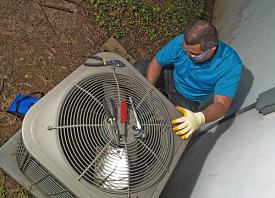Asheville summers are long, hot and humid, and an inefficient air conditioner will only add more misery to the sweltering heat when you find you’re paying sky-high energy bills in exchange for less-than-optimum comfort. That’s where spring A/C inspection comes into play. A comprehensive tuneup for your air conditioner means better cooling at a lower cost, a longer operating life for your system and fewer common problems with the air conditioner during the hottest months of the cooling season.
Early spring is the ideal time to schedule an A/C inspection. You’ll miss the rush, and your system will be ready to go the moment the thermometer rises above your comfort level.
What Does an A/C Inspection Include?
A comprehensive tuneup, performed by a skilled technician from a reputable contracting company, will include these essential checkpoints:
- Lubricate the motor, fan and other moving parts to prevent friction, which can damage your system.
- Inspect the wiring and terminals, tighten electrical connections and apply a nonconductive coating to prevent rust and corrosion.
- Measure the level of refrigerant in the system and, if it’s low, check for leaks, make repairs and top off the system with the appropriate amount of refrigerant.
- Test the electric control of your system to ensure the air conditioner cycles properly.
- Measure the airflow of your A/C for optimum performance and comfort.
- Inspect the thermostat and calibrate it for accuracy if necessary.
- Inspect ductwork for obstructions and air leaks, common causes of poor airflow and lost conditioned air.
- Clean and inspect essential components to prevent their premature failure.
- Flush the condensate drain to help prevent clogs later on, which can cause water damage and shut down your system.
- Inspect indoor and outdoor coils for scale and dirt buildup, which can prevent optimum heat exchange.
Maintenance Tasks Homeowners Can Conquer
While your spring A/C inspection and tuneup will go a long way toward lowering energy bills, an efficient system won’t perform as effectively as it should if you don’t perform these three DIY tasks each month during the cooling season:
- Inspect the A/C air filter and swap it out for a clean one when it’s full of dust. A clean filter is essential for proper airflow, improved indoor air quality and for protecting the system against dust buildup, which can cause serious problems with an air conditioner.
- Hose down the outdoor unit to remove debris from the metal fins surrounding the condenser coil and to remove dirt from the coil itself. Dirty coils prevent the optimum exchange of heat energy and can considerably reduce the efficiency of the air conditioner.
- Vacuum around the indoor unit to prevent dust, pet hair and other debris from entering the system or settling in the condensate pan, which may result in clogs that can cause water damage and shut down the system.
Reduce Your Home’s Cooling Load
Helping the air conditioner do its job efficiently will ensure a high level of comfort all summer long, lower energy bills and extend the operating life of your system. You can help take some of the load off of your air conditioner with these tried-and-true tips:
- Keep window shades closed during the day to help combat heat gain, which heats up your home when the sun’s radiant energy strikes windows.
- Use the oven, clothes dryer and other heat-generating appliances during the early morning or late evening hours to keep your home cooler during the day.
- Seal leaky windows, doors and service entrances. Air leaks considerably reduce comfort while increasing the load on your air conditioner.
- Use ceiling fans to help keep you cool. Keep in mind, though, that ceiling fans cool people, not rooms. Turn off the fans in unoccupied rooms to keep your electric bill in check.
- Remove obstructions, such as drapery and furniture, from in front of supply registers to maintain optimum airflow and air distribution.
- Install a programmable thermostat to help control cooling costs. You can program daily settings based on when you’re at home, at work and in bed.
- Insulate ductwork that runs through unconditioned spaces such as your attic and crawl spaces. Doing so will keep the air in the ducts cooler during its trip to registers, increasing comfort and reducing the air conditioner’s cooling load.
For more expert advice about how you can keep your Asheville area home cooler this summer, or to schedule an A/C inspection and tuneup with one of our highly skilled technicians, please contact us at Gentry Service Group.
Image Provided by Shutterstock.com


